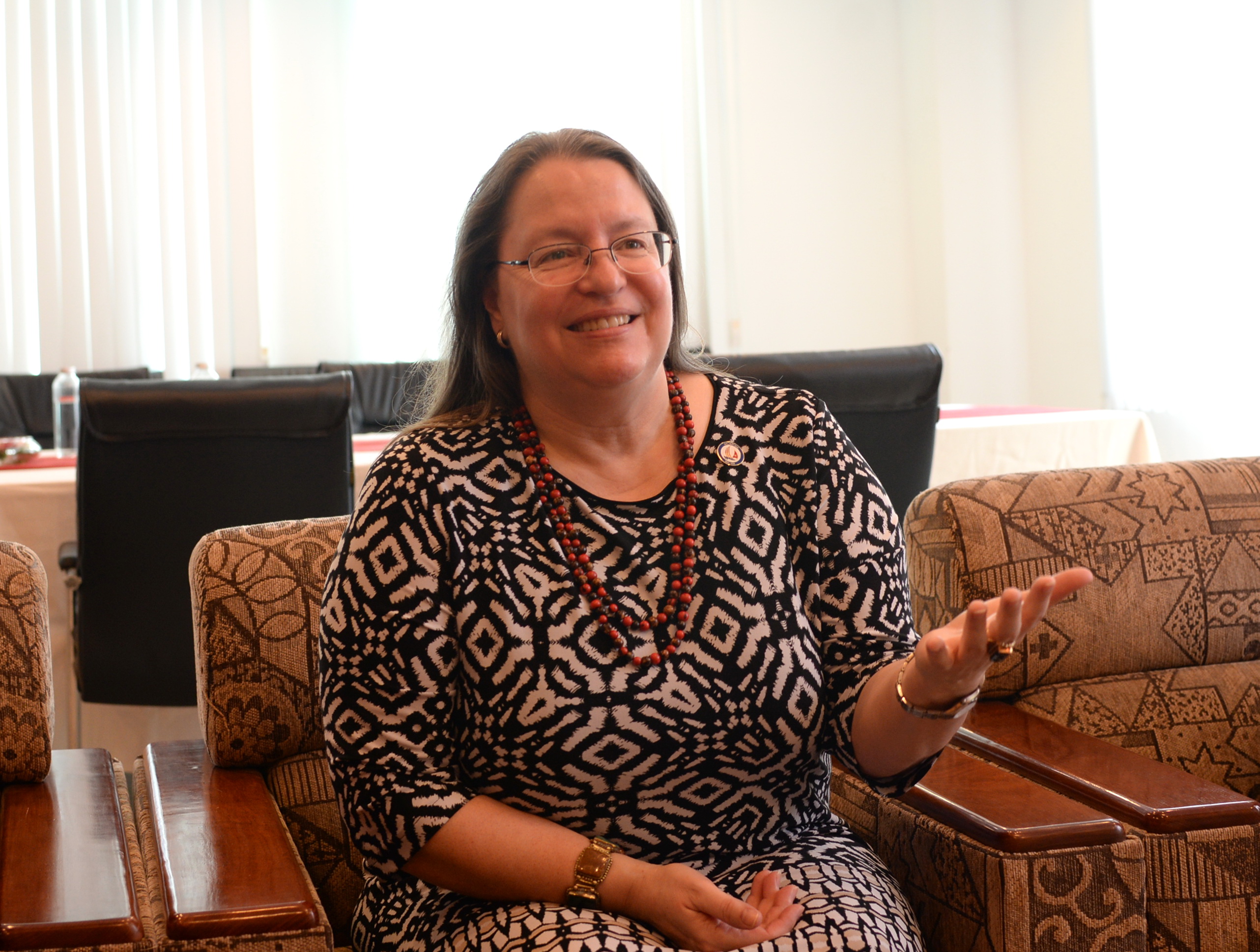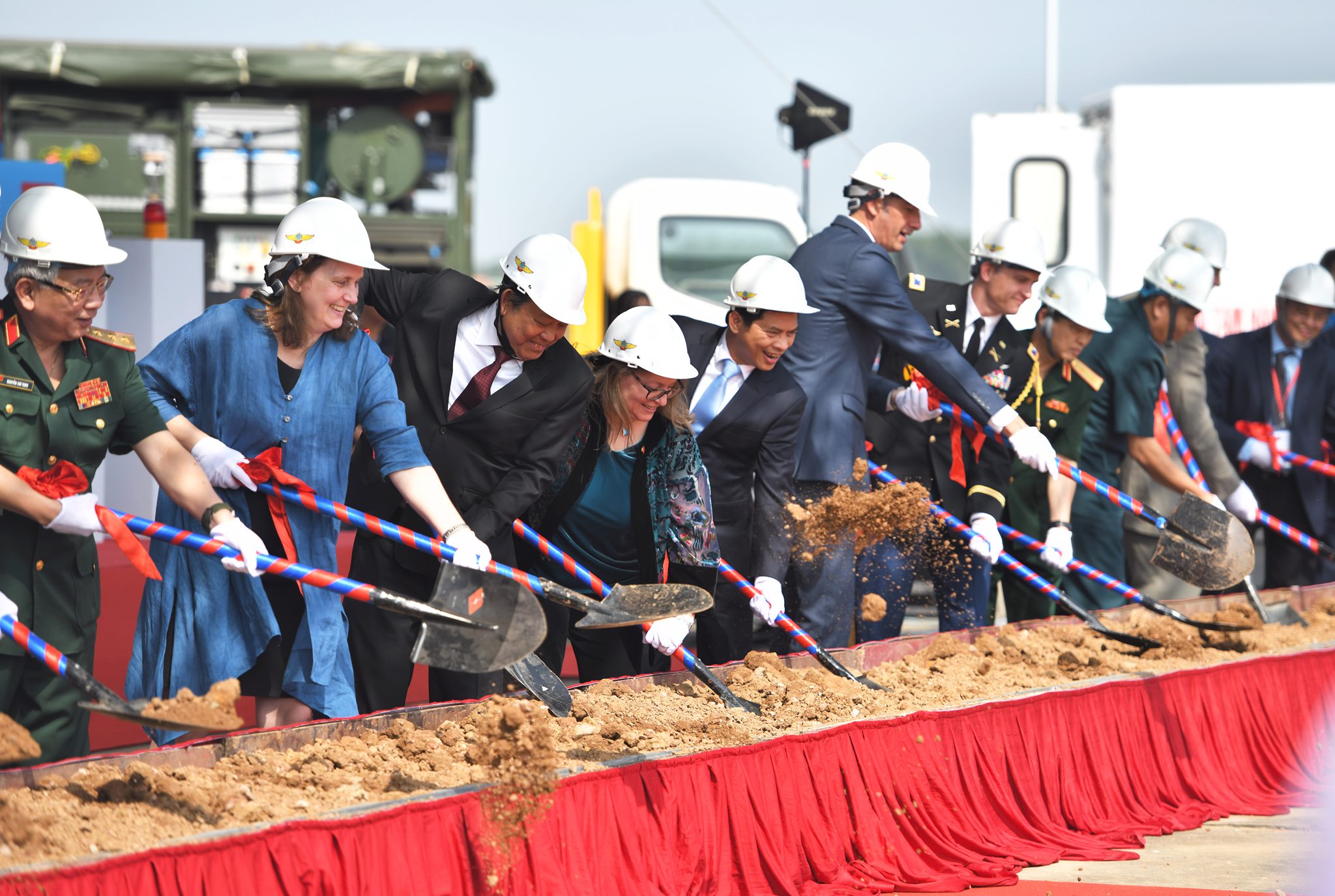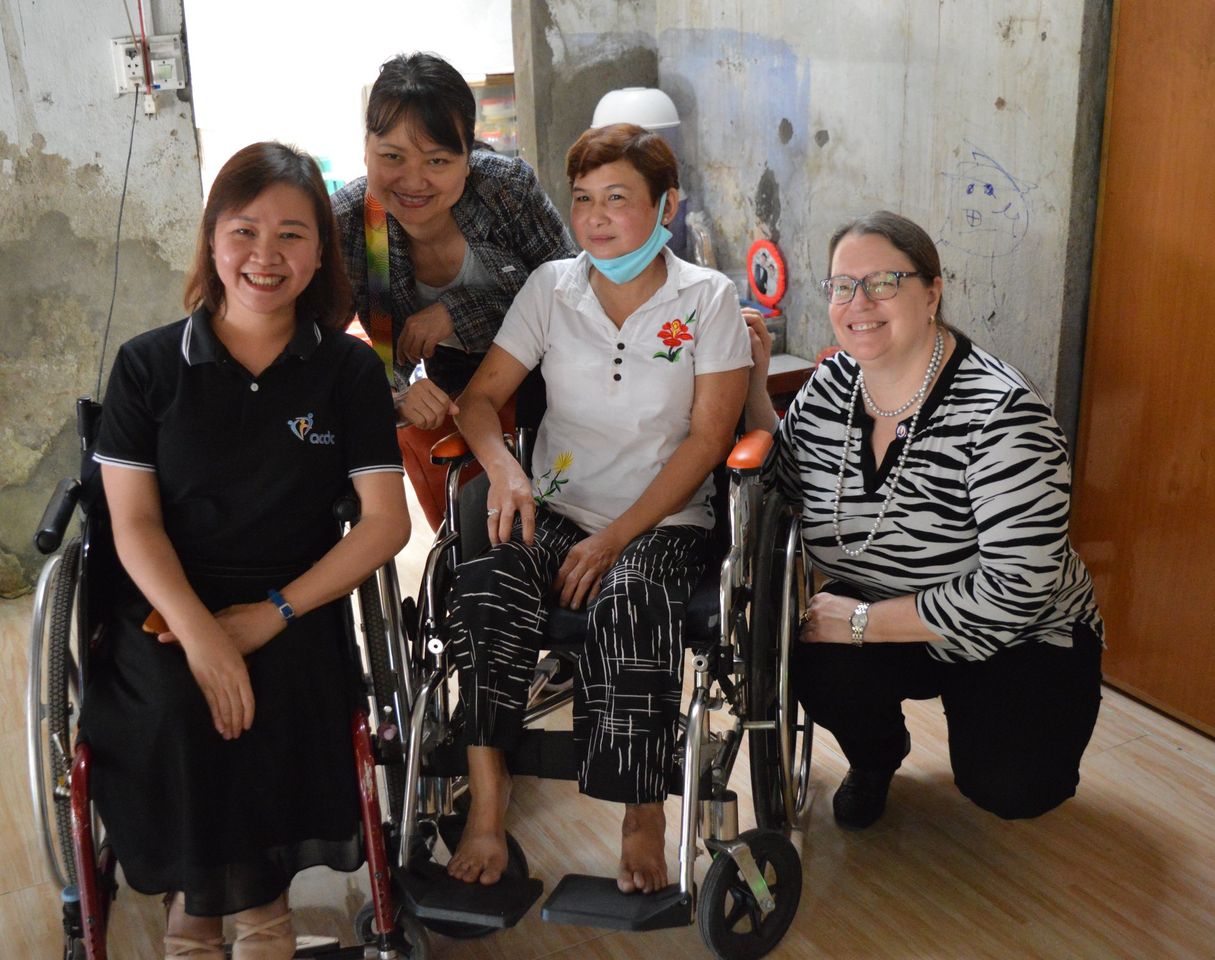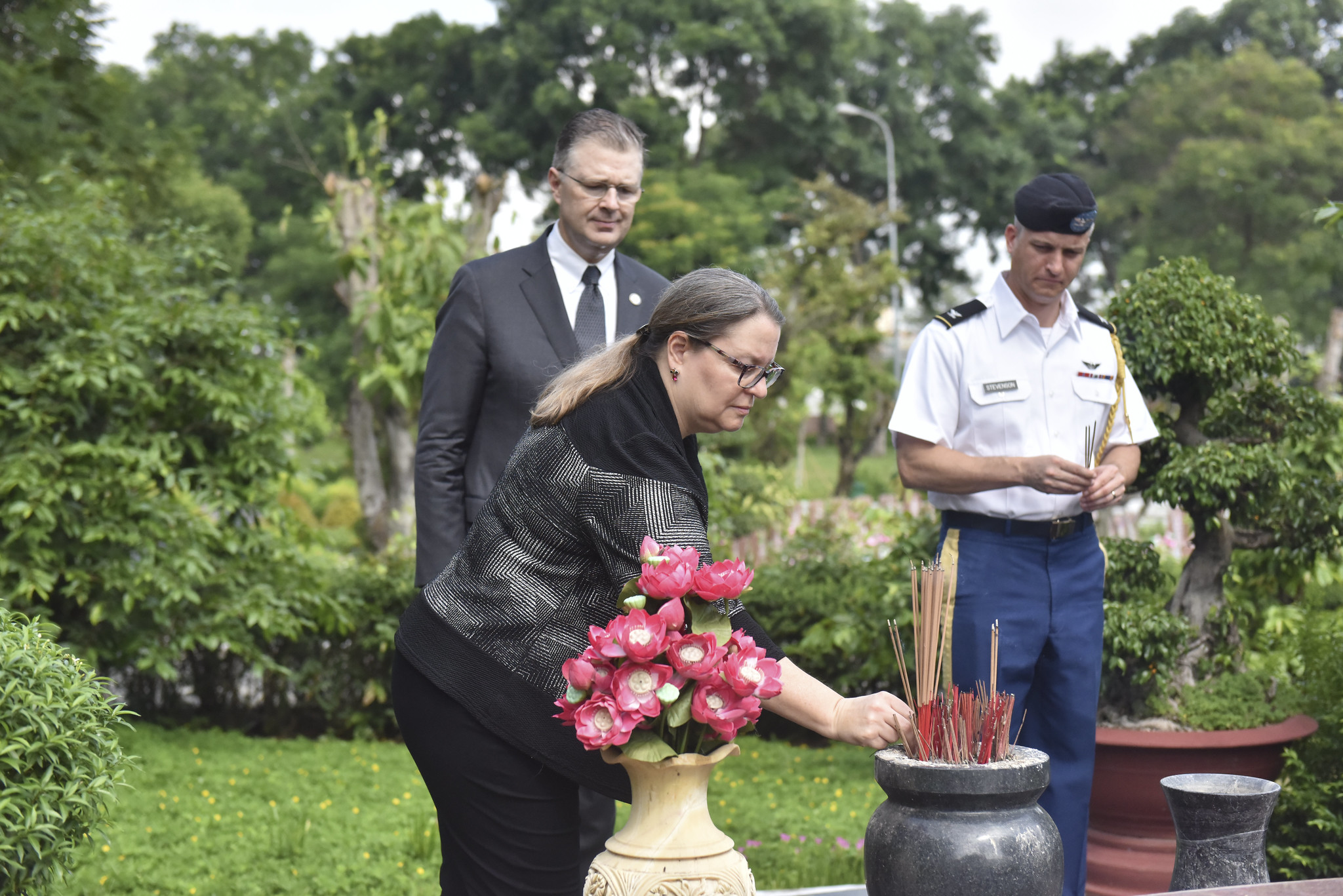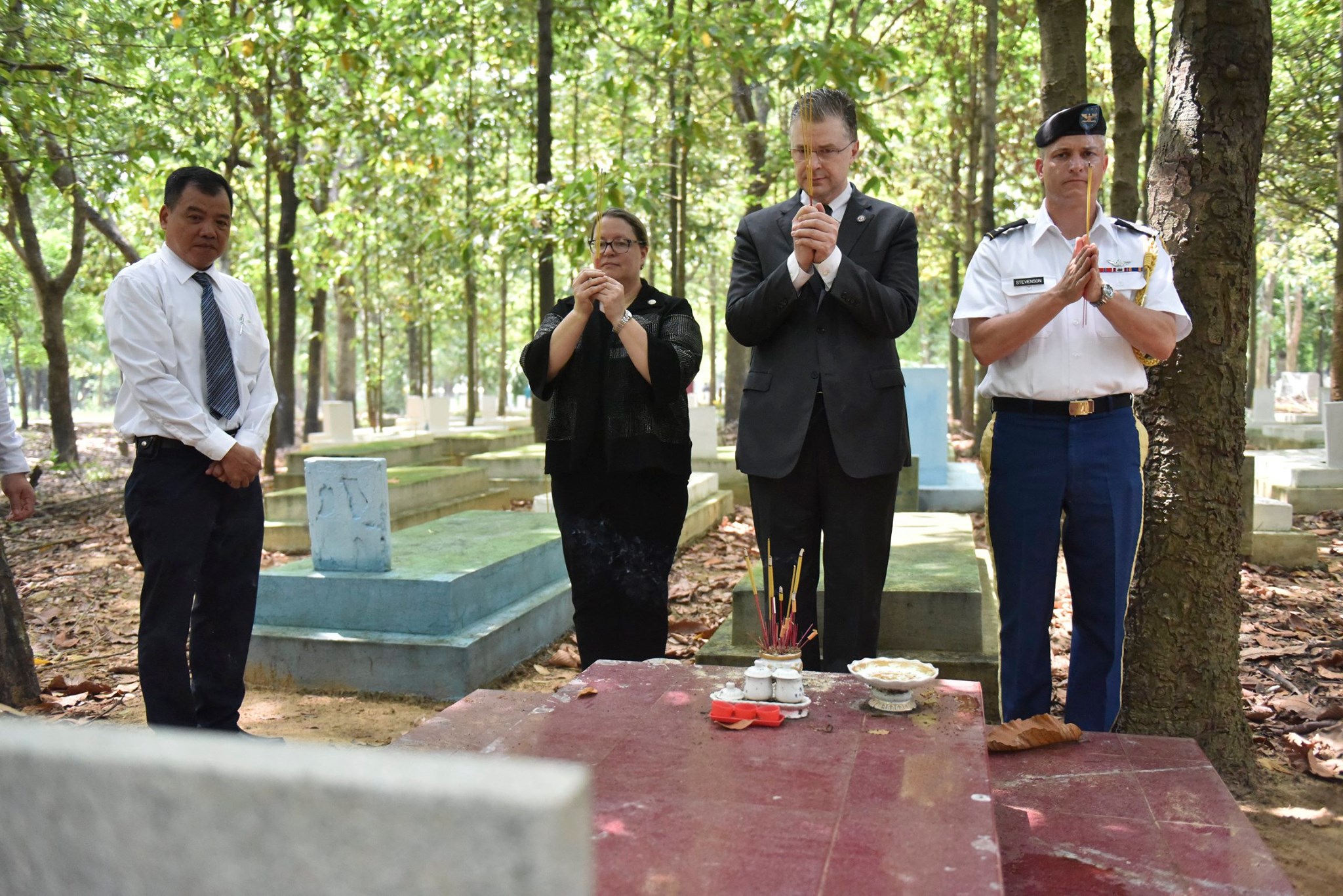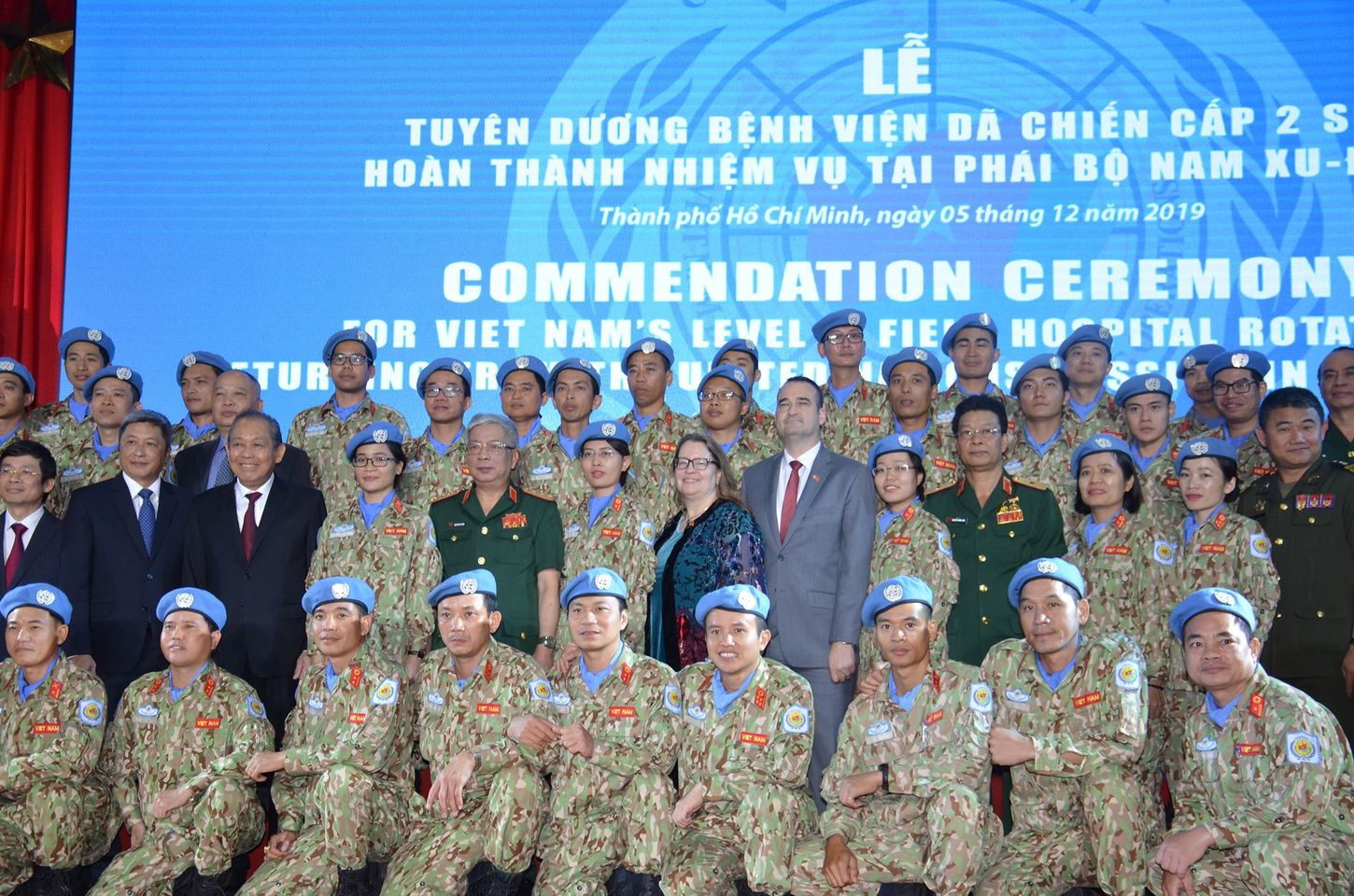Marie Damour is one of a few high-level American diplomats in Vietnam who have an intimate connection with Ho Chi Minh City.
After first coming to the city in 2002, she left and then returned 17 years later for a new position -- U.S. Consul General in the city.
Damour welcomed Tuoi Tre (Youth) newspaper for an open talk ahead of this long holiday weekend to celebrate Reunification Day (April 30) and International Workers' Day (May 1).
Her reason is simple: “I was trained to be an educator and historian. And we have a saying in English that ‘those who do not remember history are doomed to repeat it’.”
An international city with an authentic vibe
What was your impression when you arrived in Ho Chi Minh City for the first time in 2002?
I arrived in Vietnam in the summer of 2002. And after a very long flight from Washington D.C. to Hong Kong and then Ho Chi Minh City, I landed at Tan Son Nhat Airport at 11:30 pm. I got into the line for people who had diplomatic passports. And up to a certain point in the airport, I could see the people from the embassy who were there to meet me behind the immigration counter. But at the immigration counter was a very professional and stern-looking gentleman with his uniform on. I handed him my U.S. passport, which lists the state where I was born -- Kentucky. And there was a very stern gentleman, and it was very late, and I was very tired. He looked down at my passport. And he looked up at me. And he looked down. And when he looked up again, he said 'KFC.'
It took me a moment. Then, I was like 'Yes, yes, I am from Kentucky! We have Kentucky Fried Chicken! Thank you very much!' And I knew I was going to like Vietnam. Because that was such an unexpected welcome. But I thought it also was indicative since that was still relatively early -- only seven years into the relationship. The U.S. Consulate General had only been officially founded around two years before that. So the relationship was still very young. And there was a man who was making a connection between a very iconic American fast food company and my birthplace. So I thought that was going to be a good two years.
During the mission, I lived in the Indochine Park Tower in the central area of Ho Chi Minh City. Most of the people in the tower were diplomats and business people. A lot of the American businessmen there were Vietnamese American.
In your eyes, how did the city change as you came back in 2019? What do you love about the city regarding its culture, lifestyle, cuisine, and people?
When I arrived in 2019, I thought it would look like the city that I left in 2004 and to some degree it did. I recognized the traffic, I recognized the airport. But when I got to my apartment near the Independence Palace, I had a beautiful terrace and it looked out over the city and it was night-time, the entire skyline of the city has changed in the 15 years I was away.
The city’s development of the physical infrastructure is really indicative of the economic and social development that the city has undergone in 15 years. In a lot of ways, Ho Chi Minh City feels like a much more international city now than it did 17-19 years ago. From the outside, the city has definitely transformed itself into a modern 21st century metropolis, but from the inside, it has remained unique and authentic and true to itself.
Here, you can find Italian, Brazilian, Korean, and even Ethiopian food, along with world-class Vietnamese cooking. Ho Chi Minh City is truly a metropolis with so much to offer in terms of history, cultural heritage, monuments, eating, and shopping. As for the lifestyle, I find it to be a very relaxing and pleasant place to live. Vietnamese people are warm and very welcoming to foreigners, and the Vietnamese mindset of 'work to live' is apparent in everything they do.
I usually walk my dog in the mornings, and it’s always nice to see how people from this city gather on the streets to eat a bowl of pho with friends. It shows that the Vietnamese people value relationships and good food – and that to me is what makes living and working in Vietnam such a memorable and rewarding experience. I have always felt at home in Vietnam.
|
|
| Marie Damour (middle) attends the groundbreaking ceremony of a project to clean up dioxin contamination hosted by the United States Agency for International Development (USAID) and Vietnam’s Ministry of National Defense at Bien Hoa airport on December 5, 2019. Photo: U.S. Consulate General in Ho Chi Minh City |
'If I had been born in Vietnam, that could have been my father...'
American diplomats usually avoid talking about April 30, so why did you accept our invitation for an interview?
Because we cannot focus on the future if we do not respect the past. The U.S. and Vietnam have a shared history. There is a lot about that shared history, which is very sad.
I was trained to be an educator and historian. And we have a saying in English that ‘those who do not remember history are doomed to repeat it.' So when you think about how the U.S. and Vietnam renewed our diplomatic relations 25 years ago, the bedrock of that engagement between our two countries was our work on addressing the legacies of the war.
It was the people-to-people exchanges between veterans who had fought on opposite sides. It was the combined effort to identify missing-in-action soldiers. That was how we are engaged as governments and as people, and everything else came from that. So even if millions may be happy and millions may be sad, this is the reality of our history.
If we pretend it does not exist, it does nothing to help us move forward with our relationship. And I personally believe part of the strength of the U.S.-Vietnam comprehensive partnership is that we can discuss these sensitive issues, we can work together to address those legacies of the past.
It is known that your father fought in the war in Vietnam. How do you know about the war through your father's account?
One of the first things that I did here as Consul General was going to Da Nang for a ceremony, where we were returning two sets of remains believed to be American soldiers, which had been discovered as part of this search for our war dead. While I was watching these coffins draped with the American flag, all I could think of was that it could have been my father. Because when I was two years old, my father came here and he was stationed in Phu Bai, up in Thua Thien-Hue. He came home, but so many other fathers did not.
|
|
| Marie Damour visits Phu Vang District Medical Center in Thua Thien-Hue Province on April 8, 2021. Hue is where her father stationed during the war. Photo: U.S. Consulate General in Ho Chi Minh City |
I do not think you have to be Vietnamese or American in order to appreciate the sacrifice that people made for their countries. And to respect that, even if at the time they were your adversary, they paid that price for their country in the same way we paid the price for ours. Whatever you think about the war between the U.S. and Vietnam, you have to have respect for that. And so we want to make sure we are doing that.
Ambassador Daniel Kritenbrink particularly has made some very symbolic visits to two different cemeteries and to important sites during the war. He and I went together to the martyrs' cemetery here in Ho Chi Minh City.
And I think he was the first ambassador to visit that cemetery. He and I talked about it a little after that. It was personally meaningful because, first of all, they were not just from the war with the U.S., they were patriots who had sacrificed in other wars that Vietnam had fought.
When you look at the headstones and see the names, and see the dates of birth and the dates of death, they make you realize that it was young men who paid that price. And for me, it was very touching. Because if I had been born in Vietnam, that could have been my father.
Ambassador Kritenbrink said that if the two countries cooperate well to resolve war legacies, it would open up opportunities for more strategic cooperation. Do you agree?
I think he was very right. The willingness of both countries is critical for any partnership. Both countries need to be willing to address war legacies. I know many families in the United States are incredibly grateful for the work that the Vietnamese government and people have done to help us address our missing war dead.
The U.S. is absolutely committed to addressing the legacies of the war. Whether it is helping Vietnam account for its own missing. Whether it is cleaning up contaminated soil in the cities of Bien Hoa or Da Nang. Whether it is eradicating the unexploded ordnance, particularly up in the central region of the country. Or whether it is helping people with disabilities, regardless of the source in these eight or nine key provinces. That is an incredibly important part of our relationship.
From old adversaries to partners in peace
You are a daughter of an American veteran and now a senior U.S. diplomat in Vietnam, we think you understand the value of peace and friendship very well, right?
|
|
| Marie Damour, Ambassador Daniel Kritenbrink, and U.S. Defense Attaché Colonel Stevenson pay respects at the Ho Chi Minh City Military Martyrs' Cemetery on June 21, 2020. Photo: U.S. Consulate General in Ho Chi Minh City |
When you think about how the relationship has changed in 25 years, you think about economic development, not just in Vietnam but in the U.S. as well. The results of that peace were that we could begin a friendship that allowed both our countries to develop economically. And people's lives are demonstrably better than they were 25 years ago from both of our countries.
One of the great values of reflecting on history is the lesson that it offers. When you look at how quickly the U.S. and Vietnam went from being adversaries in a war to being partners in peace, I think there is real value to the rest of the world to see why it matters that you can set aside. You never forget what happened in the past, but if you focus on the future, on that friendship, on the bridge that can be built, look at how much we can do together.
You mentioned that the two countries are partners in peace. Did you mean the support that the U.S. offers Vietnam in the United Nations peacekeeping program in South Sudan?
From a government perspective, looking at the role that Vietnam is playing, you know Vietnam became the president of the Security Council at the United Nations (UNSC) in April. Vietnam is playing a much bigger role in the international community than when I was here 15 years ago.
I am also impressed [by Vietnam's delegation to South Sudan]. I have gone to a couple of ceremonies over it and the [175 Military Hospital in Ho Chi Minh City] to watch the delegation come back from South Sudan. Then, I was just over at Tan Son Nhat to say farewell to the third group of medical personnel who were going off. We have heard from the U.S. personnel in South Sudan about how impressive the Vietnamese hospital unit is in the work, which they do in their effort to connect with the community, and that they are serving both the UN peacekeepers and the local population.
I think that collaboration with the U.S. helps with the training, as we do it with many countries who are involved in UN peacekeeping. But the symbol of two former adversaries working together to create peace on an entirely different continent is incredibly important. Because if we can make peace, and be partners in that way, then the peacekeepers can help those two countries that are fighting right now make peace.
The land of future
Let's return to bilateral relations between the two countries. The first Vietnamese ambassador to the U.S. after the war, Le Bang, once said that the Vietnam-U.S. relationship had been rocketing after normalization. What do you think about his statement?
When we renewed our diplomatic relations 25 years ago, there was almost no trade between the U.S. and Vietnam.
And even when I was here in 2002, I remember it was probably somewhere like US$400-600 million in two-way trade. And nowadays, it's almost US$90 billion -- which is a huge growth figure.
|
|
| Marie Damour, Ambassador Daniel Kritenbrink, and U.S. Defense Attaché Colonel Stevenson pay respects at Bien Hoa (also known as Binh An) Cemetery on June 21, 2020. Photo: U.S. Consulate General in Ho Chi Minh City |
Before I came to Vietnam, I went around and spoke to all the different agencies in the U.S. government. I went and talked to the U.S. Chamber of Commerce, to different representational groups, so I can learn how Vietnam had changed at least from the American perspective.
It is almost impossible to overstate how enthusiastic people in Washington were about Vietnam, whether it was the comprehensive partnership, the critical role that Vietnam plays in our Indo-Pacific strategy, or the possibilities of expanding trade.
Even though we still do not have a formal free trade agreement and there are areas we need to work together, there is that enthusiasm. It is the belief that Vietnam represents both an opportunity for American businesses to invest, as well as to send and sell American products, and a trust in Vietnam as a maturing and developing economy.
How do you comment on the fight against COVID-19 pandemic of Vietnam and Ho Chi Minh City in particular, in the context that we are conversing directly without having to wear a face mask?
I am really impressed. Everybody has to recognize that Vietnam has done possibly the best job in the world, containing COVID-19 with aggressive measures that the government took to limit exposure, to do contact tracing, and to enforce quarantine. But they could not have been successful if the people of Vietnam had not been so disciplined. Everybody immediately started wearing masks everywhere. And every time there's a small outbreak, everybody does it again.
|
|
| U.S. Consul General Marie Damour (second row, middle) and Vietnamese leaders, including Deputy Minister of Defense Lieutenant General Nguyen Chi Vinh, participate in the commendation of the first level-2 field hospital for completing their duties in South Sudan, held in Ho Chi Minh City, December 5, 2019. Photo: U.S. Consulate General in Ho Chi Minh City |
It is really impressive that Vietnam has done such a terrific job. We particularly appreciate the transparency of the Vietnamese government in sharing information, whether it was the genetic sequencing that everyone around the world has been using to develop the vaccines, or the information on where the clusters are happening. It is because knowing how the disease was transmitted is incredibly important for the rest of the world to control the pandemic. You were one of the first countries affected and without that transparent exchange of information, the rest of the world would have been at a much greater disadvantage. So it has been a real privilege to watch.
What is your comment on the mutual efforts to fight the pandemic between the two countries, especially the possibility of the U.S. transferring the technology of vaccine production to Vietnam?
We talk a lot about additional cooperation on pandemic or healthcare-related issues. There has been a lot of discussion, particularly up in Hanoi with the central government about access to the various vaccines that are available.
I know Vietnam is now in human trials to have your own, which is incredibly important. Again, 20 years ago, you would not necessarily have seen that.
President Joe Biden, when he came in, announced US$2 billion to COVAX under the WHO. And there have been two recent deliveries for Vietnam, which is a start. Part of [Vietnam’s] problem with being so successful in containing [the pandemic] is perhaps the vaccination came right next. But there will be another $2 billion fund through COVAX by 2022. So as new vaccines come online and production ramps up, I fully expect to see a stronger flow into Vietnam.
Thank you so much!
I would be proud if I were Vietnamese
What do you think about the post-war generation's contribution to the Vietnam-U.S. relationship?
I have visited universities throughout the south, and talked to a lot of the folks involved in the Young Southeast Asia Leaders Initiative. If I were Vietnamese, I would be incredibly proud. It is not just because you have young people who are so interested in education, which has probably been a hallmark of Vietnam for 3,000 years, but also because they are so creative and optimistic. They are so intent on helping develop their country.
I have lived in a lot of places around the world in my 28 years in the foreign service, and very rarely come to a nation where everybody is convinced that they can make their lives, specifically in their country in general, better, and are so eager to make that happen. They are the ambassadors.
And I say that in all sincerity. You know, I'm a diplomat, we get paid to say nice things. But genuinely, it's an impressive group.
Vietnam is the sixth-largest country sending students to study in U.S. schools with around 30,000 people per year -- that is amazing when you think about it. They are those who literally represent the future of the relationship, a bridge between the American and Vietnamese people.
Marie C. Damour is a career member of the Senior Foreign Service, having joined the State Department in 1993, and is assigned to Ho Chi Minh City, Vietnam as Consul General beginning in August 2019.
She has previously served as Director in the Office of Maritime Southeast Asia in the Bureau of East Asian and Pacific Affairs, as well as in the Office of Policy Coordination and Public Affairs in the Bureau of Consular Affairs.
Her previous overseas assignments include Deputy Chief of Mission in Wellington, New Zealand; Minister Counselor for Consular Affairs in Brasilia, Brazil; and Chief of Visa Services at the U.S. Embassy in London.
She has also served domestically as Special Assistant in the Office of the Secretary, as well as Consular Chief overseas in Iraq, Vietnam, and Mauritania.
Damour is a graduate of the College of William and Mary in Williamsburg, Virginia. She speaks French, Portuguese, and Vietnamese.
What support does the U.S. give to Vietnam peacekeeping?
Responding to Tuoi Tre’s question, Juan German, press attaché of the U.S. Consulate General in Ho Chi Minh City, said the U.S. has supplied a total of $10 million to the Vietnam Peacekeeping Force, under Global Peace Operations Initiative, to assist Vietnam in building international peacekeeping capacity.
According to German, this funding is used to build and provide technical equipment for the lecture hall building in Thach Hoa Commune, Thach That District, Hanoi, to serve as training facilities for military medical forces and engineers who join the Peacekeeping Force.
In addition, the United States also provided equipment to support the deployment of Vietnam's level-2 field hospital. German added that the United States has supported Vietnam's peacekeeping since 2008.
“The role and contribution of Vietnam in the UN peacekeeping mission demonstrate the growing influence of Vietnam in the region and around the world. The U.S. supports Vietnam to play a larger role in the international arena,” German emphasized.
Hong Van
Like us on Facebook or follow us on Twitter to get the latest news about Vietnam!



